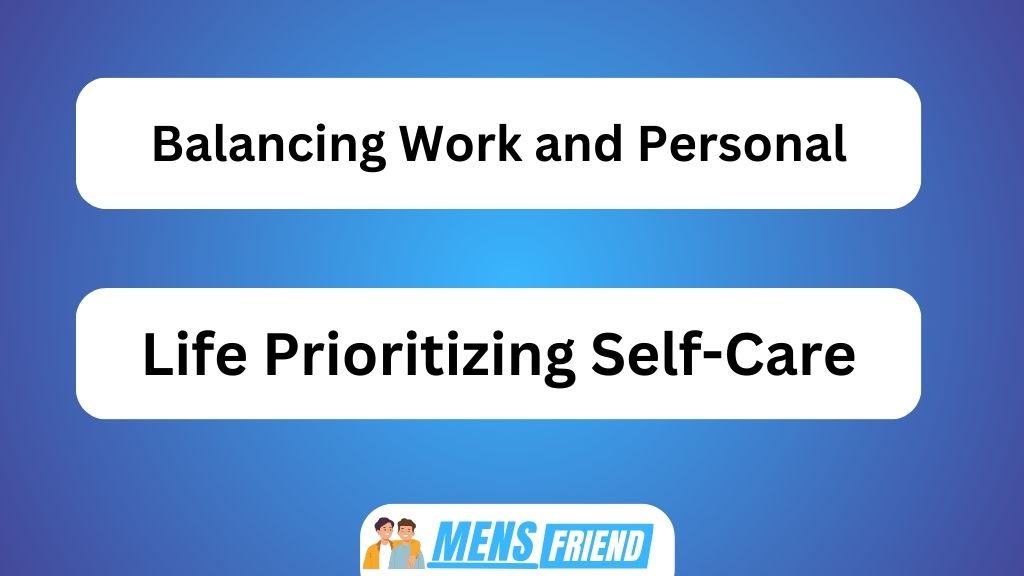In our busy lives, finding a balance between work and personal commitments can often feel like an uphill battle. But here’s the thing: prioritizing self-care is not just a luxury, it’s a necessity.

We’ve all been there – burning the candle at both ends, feeling overwhelmed and stressed out. But by setting boundaries and putting ourselves first, we can create a personalized self-care routine that helps us find that much-needed equilibrium.
So let’s dive in together and explore different forms of self-care for achieving work-life balance while overcoming guilt and building a supportive network.
Key Takeaways of Balancing Work and Personal Life Prioritizing Self Care
- Prioritizing self-care is crucial for balancing work and personal life.
- Neglecting self-care can lead to increased stress and burnout.
- Recognizing signs of burnout and stress is important in taking action and managing stress effectively.
- Setting boundaries, prioritizing your needs, and customizing self-care activities can help maintain a healthy work-life balance.
The Importance of Self-Care in Balancing Work and Personal Life
You should prioritize self-care because it plays a crucial role in balancing your work and personal life. Taking care of ourselves is often overlooked when we are busy juggling our responsibilities, but neglecting self-care can lead to increased stress and burnout.
Self-care is not selfish; it is necessary for our overall well-being. By making time for activities that rejuvenate us, such as exercise, meditation, or hobbies we enjoy, we can manage stress more effectively.
It’s important to integrate self-care into our daily routines by setting aside dedicated time for ourselves. Whether it’s waking up 15 minutes earlier to practice yoga or taking a walk during lunch break, small actions can make a big difference in reducing stress levels and maintaining balance.

Recognizing the signs of burnout and stress is essential for preventing them from escalating.
Recognizing Signs of Burnout and Stress
Recognizing signs of burnout and stress can be crucial for maintaining a healthy work-life balance. It’s important to listen to our bodies and minds, as they often give us subtle cues when we’re reaching our limits. Here are some key signs to look out for:
- Constant fatigue and lack of energy
- Difficulty concentrating or making decisions
- Increased irritability or mood swings
- Withdrawal from social activities
If you notice any of these symptoms, it’s essential to take action and manage your stress effectively. Remember that self-care is not selfish; it’s necessary for your overall well-being. Start by setting boundaries, both at work and in your personal life. Prioritize activities that bring you joy and relaxation, whether it’s practicing mindfulness, exercising, or spending time with loved ones.
Seek support from friends, family, or professionals if needed. By recognizing burnout and managing stress proactively, you can create a healthier work-life balance and thrive in all areas of your life.
Strategies for Setting Boundaries and Prioritizing Your Needs
When it comes to maintaining a healthy work-life balance, it’s crucial for us to establish clear boundaries. This means clearly defining our limits and communicating them assertively. By doing so, we empower ourselves and others to respect our time and energy.
Additionally, prioritizing self-care as non-negotiable is key in avoiding burnout and fostering overall well-being. Making time for activities that recharge us physically, mentally, and emotionally is not only necessary but also beneficial for our productivity and happiness.

Lastly, learning to say no with confidence allows us to prioritize our needs without guilt or fear of disappointing others. It’s important to remember that by setting boundaries and practicing self-care, we are taking care of ourselves first so that we can show up fully present and energized in all areas of our lives.
Establishing Clear Boundaries
Establishing clear boundaries is crucial for maintaining a healthy work-life balance. When it comes to establishing healthy boundaries, we need to set realistic expectations for ourselves and communicate them effectively. Here are some key points to consider:
- Take control of your time: Prioritize tasks and allocate specific blocks of time for work and personal life.
- Learn to say no: It’s okay to decline additional work or commitments if they interfere with your well-being.
- Communicate openly: Clearly express your needs and limitations to colleagues, clients, and loved ones.
- Disconnect from technology: Set aside dedicated periods without electronic distractions.
By implementing these strategies, we can create a harmonious balance between work and personal life.
Now let’s transition into the next section about the importance of self-care as non-negotiable in achieving this equilibrium.
Self-Care as Non-Negotiable
Make sure you take time for yourself and prioritize your well-being as an essential part of maintaining a healthy work-life balance. Self-care is not something to be negotiated or put on the backburner; it is crucial for our overall happiness and success. By practicing self-care, we can recharge our batteries, reduce stress levels, and improve our mental, emotional, and physical health.
To help you get started on your self-care journey, here are some essential practices that you can incorporate into your daily routine:
| Self-Care Essentials | Description | Benefits |
|---|---|---|
| Regular exercise | Boosts energy levels | Improves mood |
| Quality sleep | Enhances cognitive function | Reduces risk of burnout |
| Healthy eating | Fuels the body | Increases productivity |
| Mindfulness practice | Reduces stress | Improves focus |
| Leisure activities | Provides relaxation | Promotes work-life balance |
Saying No With Confidence
You can confidently say no to additional commitments without feeling guilty or overwhelmed. It’s essential to prioritize your well-being and set boundaries with grace. Here are some tips to boost your confidence in decision-making and assertively communicate your limits:
- Trust yourself: Believe in your ability to make choices that align with your needs and values.
- Know your limits: Understand what you can realistically handle, both mentally and physically.
- Practice self-care: Prioritize activities that nourish your mind, body, and soul.
- Communicate assertively: Be clear and honest when declining requests, expressing gratitude for the opportunity.
Remember, saying no does not make you selfish or irresponsible. It shows respect for yourself and allows you to focus on what truly matters.
Embrace the power of setting boundaries confidently, knowing that you deserve a balanced life filled with self-care.
Creating a Personalized Self-Care Routine
When it comes to self-care, we understand the importance of prioritizing our well-being. It’s crucial to customize our self-care activities based on what truly brings us joy and relaxation.
Consistency is key in maintaining a healthy self-care routine that nurtures both our physical and mental health.
Importance of Self-Care
It’s important to prioritize self-care in order to maintain a healthy work-life balance. Taking care of ourselves not only benefits our physical and mental well-being, but also enhances our productivity and overall happiness.
Here are some key reasons why self-care is crucial:
- Reduced stress: Engaging in activities that help us relax and unwind can significantly reduce stress levels.
- Improved focus: By taking time for ourselves, we recharge our energy and enhance our ability to concentrate on tasks.
- Enhanced creativity: Self-care allows us to tap into our creative side, leading to fresh ideas and innovative thinking.
- Increased resilience: Taking care of ourselves equips us with the strength and resilience needed to overcome challenges.
By prioritizing self-care, we empower ourselves to lead fulfilling lives while effectively managing our responsibilities.
Now, let’s explore how we can customize self-care activities to suit our individual needs and preferences.
Customizing Self-Care Activities
Finding activities that suit our individual preferences and needs is key to customizing our self-care routine. It’s important to remember that self-care is not a one-size-fits-all approach; what works for one person may not work for another. When it comes to customizing self-care activities, it’s crucial to consider our own interests, personality traits, and energy levels. For introverts, finding solitude and quiet activities can be especially beneficial. Whether it’s reading a book, practicing mindfulness meditation, or taking a long bath, introverts often thrive in calm and peaceful environments. To help you get started on customizing your own self-care routine, here is a table showcasing different types of self-care activities that can cater to introverts:
| Type of Activity | Description | Benefits |
|---|---|---|
| Reading | Delve into a good book | Provides mental escape |
| Meditation | Practice mindfulness | Reduces stress and promotes relaxation |
| Journaling | Write down thoughts and feelings | Enhances self-awareness |
Consistency in Self-Care
Maintaining a regular self-care routine can help to establish healthy habits and promote overall well-being. Building self-discipline is key when it comes to incorporating self-care into our daily routines.
Here are some tips to help you stay consistent:
- Start small: Begin with one or two self-care activities that you enjoy and can easily fit into your schedule.
- Set reminders: Use alarms or calendar notifications to remind yourself to prioritize self-care throughout the day.
- Make it a non-negotiable: Treat your self-care time as an important appointment that cannot be canceled or rescheduled.
- Be flexible: Life can get busy, so be willing to adjust your routine when necessary, but always make sure to make time for yourself.
Exploring Different Forms of Self-Care for Work-Life Balance
There are many ways we can explore different forms of self-care to achieve a better work-life balance. One effective method is through mindfulness techniques, which allow us to be fully present in the moment and reduce stress. By taking time each day to practice mindfulness, whether it’s through meditation or simply focusing on our breath, we can cultivate a sense of calm and clarity that helps us navigate the challenges of work and personal life.
Another way to prioritize self-care is by engaging in creative outlets. Whether it’s painting, writing, playing an instrument, or any other form of artistic expression, these activities provide an outlet for our emotions and allow us to tap into our creativity. Not only do they help us relax and unwind after a long day at work, but they also give us a chance to explore different parts of ourselves that may not get attention in our professional lives.
Here is a table that showcases some examples of mindfulness techniques and creative outlets that can be incorporated into our daily routine:
| Mindfulness Techniques | Creative Outlets |
|---|---|
| Meditation | Painting |
| Deep breathing exercises | Writing |
| Yoga | Playing an instrument |
| Mindful walking | Dancing |
| Body scan | Photography |
Overcoming Guilt and Prioritizing Your Well-being
To overcome guilt and prioritize your well-being, it’s important to acknowledge that taking care of yourself is not selfish, but necessary for a healthy and fulfilling life. Here are some ways to prioritize self-care guilt free:
- Set boundaries: Learn to say no without feeling guilty. Your time and energy are valuable.
- Practice self-compassion: Treat yourself with kindness and understanding, just as you would a loved one.
- Make time for activities you enjoy: Whether it’s reading, exercising, or simply taking a long bath, carve out moments for things that bring you joy.
- Seek support: Surround yourself with people who understand the importance of self-care and can offer encouragement.
Building a Supportive Network for Self-Care and Work-Life Balance
After recognizing the importance of prioritizing our well-being, we must now focus on building a strong support system to help us maintain work-life balance and self-care. Surrounding ourselves with people who understand and support our journey is crucial. This network can consist of friends, family, colleagues, or even online communities that share similar experiences.
To visualize the impact of a supportive network, let’s look at this table:
| Supportive Network | Emotional Support | Practical Help |
|---|---|---|
| Friends | ✓ | ✓ |
| Family | ✓ | ✓ |
| Colleagues | ✓ | ✓ |
Seeking professional help is also an excellent option when needed. Therapists or coaches can provide guidance and strategies tailored to our specific challenges.
Remember that building a support system doesn’t mean relying solely on others but rather creating a community where we can lean on each other whenever necessary. Together, we can overcome any obstacles and thrive in both our personal lives and careers.
Frequently Asked Questions
How Do I Know if I Am Neglecting Self-Care in My Life?
We can tell if we’re neglecting self-care by recognizing signs like feeling exhausted, overwhelmed, or constantly stressed. It’s important to be aware of the importance of self-care for our well-being and make it a priority in our lives.
What Are Some Common Misconceptions About Self-Care?
Some common misconceptions about self-care are that it is selfish or a luxury. However, taking care of ourselves is essential for our well-being and allows us to show up as our best selves in all areas of life.
How Can I Incorporate Self-Care Into My Daily Routine?
Incorporating self-care into our daily routine is essential for our well-being. We can prioritize self-care by engaging in easy practices such as meditation, exercise, setting boundaries, and taking time for ourselves.
Are There Any Specific Self-Care Practices That Are More Effective for Work-Life Balance?
When it comes to finding balance in self-care activities, there are definitely specific practices that can be more effective for work-life balance. Let’s explore some of these empowering strategies together.
How Can I Overcome Resistance From Others When Prioritizing My Self-Care Needs?
Overcoming resistance from others when prioritizing our self-care needs can be challenging. However, setting boundaries and communicating the importance of self-care to those around us can help us gain their support and understanding.
Conclusion
In conclusion, prioritizing self-care is essential for achieving a healthy work-life balance. By recognizing the signs of burnout and stress, setting boundaries, and creating a personalized self-care routine, we can take control of our well-being.
It’s important to explore different forms of self-care that resonate with us and overcome any guilt we may feel about putting ourselves first. Building a supportive network will also help us stay accountable and maintain work-life balance.
So, why wait? Start prioritizing your self-care today and watch as your life transforms into one of empowerment and fulfillment.



